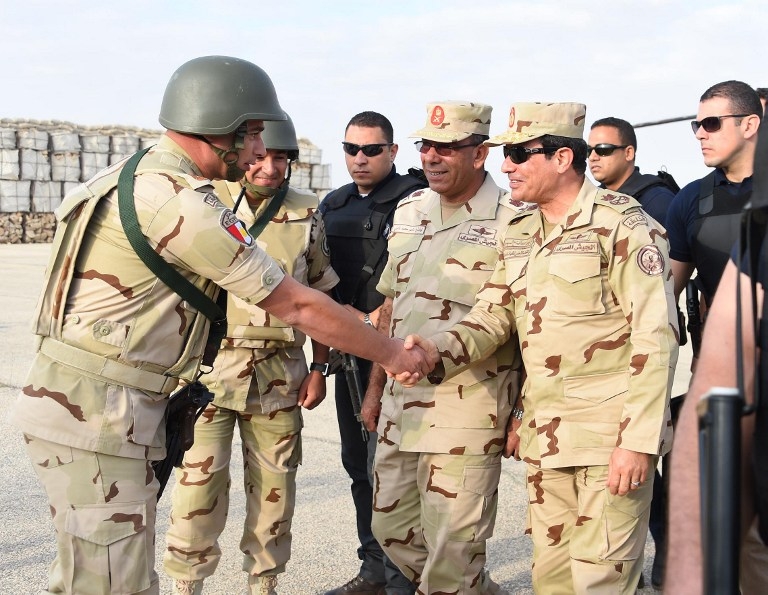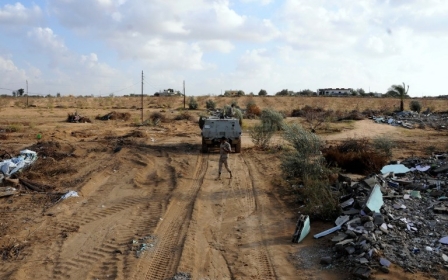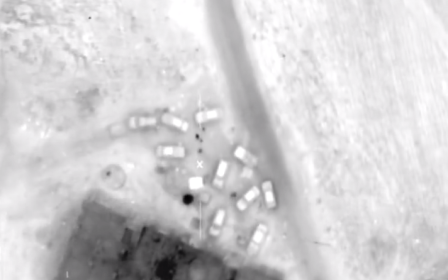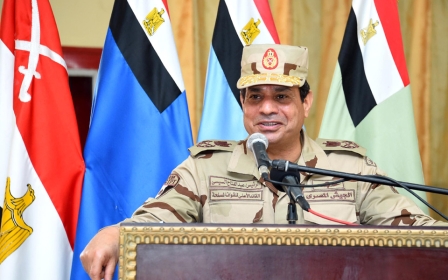Observers point toward discord in Sisi's visit to Sinai barracks

Dressed in military fatigues, Egyptian President Abdel Fattah al-Sisi visited the Sinai Peninsula on Saturday for the first time since Sinai-based militants affiliated with the Islamic State (IS) group killed 21 Egyptian soldiers, according to official sources.
Sisi's visit was carried out under heavy security and with the utmost discretion. The trip was under a publication ban until the president returned to Cairo.
"I have come to salute the heroes of the armed forces and to express to them my recognition," he was quoted by the army's spokesman as saying, according to AFP.
The president's office said he was "inspecting troops and police in the North Sinai," without specifying where in the restive area he was visiting.
"We are still recovering the bodies of terrorists from the latest attack," Sisi said.
The president said he saluted "every home, every mother whose child has died a martyr or was wounded for Egypt," AFP reported.
Internal schisms
But while Sisi’s words elicited feelings of nationalist pride among many Egyptians supporting the government, observers quickly pointed out clear discord in the president’s Sinai visit.
While Sisi’s son-in-law and chief of military staff, Mahmoud Hegazy, joined him on Saturday’s visit, Egypt’s Minister of Defence Sedky Sobhy carried out a separate visit to the military barracks only a day before.
At the same time, Sobhy had reportedly visited the injured soldiers and their families on Thursday alone, without Sisi accompanying him.
Observers have highlighted these incidents to point toward a deepening rift between the president and his minister of defence which they say has reached a new low after a meeting of the Supreme Council of Armed Forces (SCAF) was recently convened in the absence of Sisi, according to a Monday report on Arabic news website Arabi21.
According to Arabi21’s sources, although Sisi and Sobhy had been close allies in the wake of the 2013 military coup, the two men are now in an aggressive competition to establish their sole authority over the military.
When Sisi stepped down as Egypt’s minister of defence - a position he was appointed to on 12 August 2012 by then-president Mohamed Morsi - to run for president, the ministerial position was handed over to Sobhy, who was known at the time for being very dependable.
After Sisi became president, Sobhy became the highest authority over the military and took full control over its resources, while Sisi maintained control over the media, a position which lent him more exposure and positive PR for his efforts among Egyptians and observers.
According to Arabi21, media sources had previously reported that Sisi tried to get rid of Sobhy as his defence minister by offering him a chance to step down from it for a consultative governmental position instead.
Sobhy allegedly refused the offer, hoping to remain as Egypt’s defence minister until he can move into the presidency, just as Sisi did in 2013, the Arabi21 report said.
According to the paper, Sisi’s Saturday visit was prompted by a Friday media report on the Egyptian news website Veto that praised Sobhy for his role as defence minister and described him as “a defence minister akin to a soldier”.
Sobhy has reportedly pushed for new intensive military trainings and worked to forge a variety of cooperation agreements with regional and international powers, a move which Arabi21 described as Egypt’s only real defence against internal security threats.
According to the paper, Sobhy, who is known to be a strong leader within the military echeolons, has sent delegations to neighbouring countries as well as the Muslim Brotherhood – despite having staunchly supported the crackdown on the group - conveying his readiness to be part of a dialogue aimed at resolving the current stalemate in Egypt.
Reports highlighting divisions within Egypt's ruling elite have emerged over the past few months, with some observers pointing towards a possible move from within the military echolons to replace Sisi as Egypt's economic and political situation continues to deteriorate following the military takeover of July 2013.
Sisi afraid?
After Sisi's visit, experts discussed possible internal division within Egypt's ruling elite, while observers became increasingly occupied with a video clip showing Egyptian television anchor Lamees al-Hadidy sharply criticising the president for being “clearly afraid” during his Sinai visit.
In the clip, which quickly went viral on social media platforms, Hadidy is shown ridiculing the president while Sisi is pictured in the background surrounded by his own security personnel, despite being among soldiers and other military men in the Sinai barracks.
“Are you really afraid to that extent?” Hadidy is shown asking mockingly.
“How could you be so scared when you’re surrounded by your own soldiers, [the ones you've said are] the source of your pride and the backbone of your support system,” she adds in the clip.
The video of Hadidy openly criticising Sisi evoked great surprise among observers, since the popular media anchor is widely known for her staunch support of Sisi and his government.
But according to London-based Arabic news website al-Araby al-Jadid, it was quickly revealed that the video was not in fact authentic, but was collated by a critic of Sisi by linking photos of the president’s Sinai visit to Hadidy’s commentary on former president Morsi’s visit to military positions before he was ousted by Sisi in July 2013.
The objective behind the video was to highlight the hypocrisy of Egyptian media coverage, since similar conduct by Morsi had elicited sharp criticism against the former president, reported al-Araby al-Jadid.
In a tweet, Hadidy instantly rebuked the claim that she had criticised Sisi.
“My only response is that the video is obviously fabricated, [something] the terrorist Brotherhood regularly uses to distort the image of the Egyptian media,” she said.
New MEE newsletter: Jerusalem Dispatch
Sign up to get the latest insights and analysis on Israel-Palestine, alongside Turkey Unpacked and other MEE newsletters
Middle East Eye delivers independent and unrivalled coverage and analysis of the Middle East, North Africa and beyond. To learn more about republishing this content and the associated fees, please fill out this form. More about MEE can be found here.




